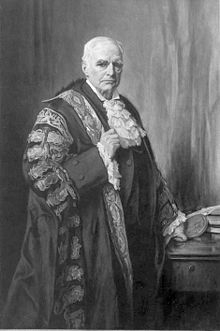Robert Finlay, 1st Viscount Finlay
|
The Right Honourable The Viscount Finlay GCMG PC KC |
|
|---|---|
 |
|
| Lord Chancellor | |
|
In office 10 December 1916 – 10 January 1919 |
|
| Monarch | George V |
| Prime Minister | David Lloyd George |
| Preceded by | The Lord Buckmaster |
| Succeeded by | The Lord Birkenhead |
| Personal details | |
| Born |
Robert Bannatyne Finlay 11 July 1842 Newhaven, Edinburgh |
| Died |
9 March 1929 (aged 86) Kensington, London |
| Nationality | British |
| Political party |
Liberal Liberal Unionist |
| Spouse(s) | Mary Innes (d. 1911) |
| Alma mater |
University of Edinburgh Middle Temple |
Robert Bannatyne Finlay, 1st Viscount Finlay, GCMG PC KC (11 July 1842 – 9 March 1929) was a British lawyer, doctor and politician who became Lord Chancellor of Great Britain.
Finlay was born in Newhaven, Edinburgh, the son of William Finlay, a physician, and Ann, daughter of Robert Bannatyne. He was educated at the Edinburgh Academy and Edinburgh University, graduating in medicine in 1864.
After entering Middle Temple as a student in 1865, Finlay was called to the bar two years later and built up a successful practice, becoming a Queen's Counsel in 1882. Three years later he was elected Liberal Member of Parliament for the Inverness Burghs, but broke with William Ewart Gladstone over Irish Home Rule and joined the Liberal Unionists in 1886. He lost his seat in 1892 but regained it three years later, the same year he was appointed Solicitor General and knighted.
In 1900, Finlay became Attorney General for England and Wales and also became President of the Edinburgh Sir Walter Scott Club, and gave the Toast to Sir Walter at the club's annual dinner. In 1902 he was elected Lord Rector of Edinburgh University. For his services in representing the British Empire in a number of international legal arbitrations he was appointed GCMG in 1904, and the following year became a Privy Counsellor. However, in the 1906 general election he again lost his seat, and it was to be another four years before he returned to Parliament as representative for Edinburgh and St Andrews Universities. One of his last official acts as Attorney General was to appoint his son, William, as a junior counsel to the Board of Inland Revenue, an appointment which provoked much negative comment.
...
Wikipedia
